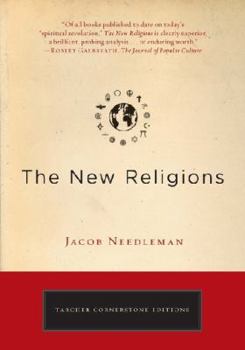The New Religions
Select Format
Select Condition 
Book Overview
Philosopher Jacob Needleman's groundbreaking study of America's alternative spiritual movements is back in print with a new introduction by the author. Originally published in 1970, The New Religions... This description may be from another edition of this product.
Format:Paperback
Language:English
ISBN:1585427446
ISBN13:9781585427444
Release Date:October 2009
Publisher:Tarcherperigee
Length:272 Pages
Weight:0.57 lbs.
Dimensions:0.8" x 7.1" x 5.0"
Age Range:18 years and up
Grade Range:Postsecondary and higher
Customer Reviews
2 ratings
Fascinating, and Helpful
Published by Thriftbooks.com User , 14 years ago
Forty years after first publication, Needleman's book still provides wise insights on the attraction of new religions and religious movements for seekers in the West. I just read this new Tarcher Cornerstone edition (the first time I have ever read the entire book) and it confirmed my own experience with religions and spirituality over the same period. Beginning in the 60s, many teens and adults (myself included) intuitively responded to the potentials for personal and cosmic transformation within the new religions, potentials either ignored or even demonized in our own conventional religious communities. For me, this response is ongoing, with the deepening understanding that each tradition may assist in that transformation, but it "takes a village," a global village of religions and spiritualities to support the continuing experience. Needleman's book was an early recognition of transformative religious potentials for the West in the exotic traditions of the East; reading this new edition now allows me to recognize and honor that potential in my own experience. Read it for yourself, again, or for the first time.
A Classic by a Pioneer in Religious Diversity
Published by Thriftbooks.com User , 14 years ago
If you're already considering this book, you may have read others by Dr. Jacob Needleman or you might have seen him in a Bill Moyers documentary on PBS. From his base as an educator--a university professor in San Francisco--Needleman has produced a long string of books for general readers. Some of his other books look at individual themes within religion--the nature of money, for example, or the challenge of being "good." At age 77, he also produced "What Is God?" That new book is his memoir of a life-long search for the nature of God. That's also a book I strongly recommend as a starting point for enjoying Needleman's thought-provoking works. It's this 1970 classic, though, that earns him the title "pioneer" in this field of understanding America's ever-expanding religious diversity. In an interview I did with Needleman in early 2010, he joked about the challenge of reaching back through the decades to read one's earliest works. He said it usually takes a stiff drink not to wince at the dated references. In this case, though, he didn't wince. He liked what he read. I agree and I'm sure that's why Tarcher Cornerstone has issued this classic edition. I had the original on my shelf and then read the new edition, which has a fresh preface by Needleman. There are sections that haven't dated well, for example: I'm sure that, today, Needleman would write an entirely different section on Tibetan Buddhism and the Dalai Lama, which he clearly hadn't encountered extensively enough when he wrote this 1970 book. But the book does stand up quite well 40 years later! The book is fun and enlightening. For example, there's a short chapter called, "What Is California?" Back in 1970, this was a huge question around American water coolers and dinner tables, voiced more like: "What in the heck are they doing in California?" Overall, the book is a great guided tour of some of the "exotic" religious movements showing up on the West Coast. The overview of Zen, for example, still represents a helpful introduction. And the writing style, which is similar to "magazine style," is engaging. Describing the Maharishi, for example, he writes: "The appearance of this man and his teaching had seemed more like the run of a Broadway show than the coming of a new spiritual dispensation." Ultimately, his judgment is solid. In a section on spiritual teachers who encourage passivity from their followers, he warns against them: "They do not engage the aspirant in a way that would enable him to see for himself the nature of the human condition." Finally, this book would be great for a small group--especially among readers of an age sufficient to "look back" with each other and chart America's diverse changes.





